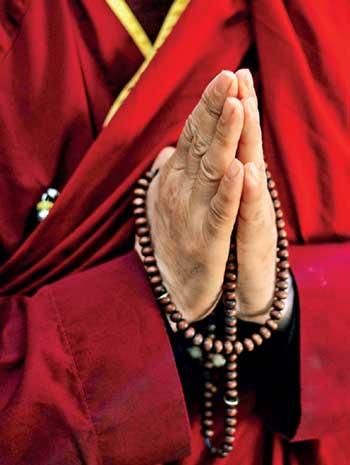14 Dec 2024 - {{hitsCtrl.values.hits}}

 Drawing from a thought-provoking discussion on our podcast, read to explore how the idea of oneness and interconnectedness can shift your perspective.
Drawing from a thought-provoking discussion on our podcast, read to explore how the idea of oneness and interconnectedness can shift your perspective.
What if we saw the world differently; not as a collection of separate lives and identities but as one interconnected web? The idea of oneness has the power to shift our perspective, helping us foster connection, understanding, and harmony. It’s a concept that goes beyond culture, religion, or personal identity, reminding us of a simple truth: we all share this journey of being human.
So, what exactly does oneness mean? Twesha Khanijow, an educator and expert in Buddhist Philosophy, breaks it down beautifully: “Oneness is seen in two ways: equality for all through the method of equalising self with others, and interdependence, that every phenomenon arises because of the previous phenomenon. Oneness is essential because it helps to see others as equal to yourself no matter what status, caste, creed, or colour.”
It’s an idea that feels especially urgent in today’s fast-moving, hyper-connected world. But how do we stay grounded in this principle of unity when life pulls us in so many directions?
Priyanka Nadiya, a storyteller and writer with a knack for weaving philosophy into everyday life, offers some practical advice: “Cultivating a sense of oneness begins with practices that nurture mindfulness, compassion, and a deeper connection to the world. Mindfulness in daily activities helps people recognize the interconnected nature of life. Gratitude is another powerful habit; reflecting on how others contribute to one’s life can lead to a deeper appreciation of shared existence.”
Practical ways to cultivate oneness
Here are some additional ways to embrace oneness in your life:
Simple habits like these are small but impactful ways to weave oneness into our daily lives. But Nadiya also reminds us that there are challenges: “The biggest barriers to understanding or practising oneness are often divided based on social, psychological, and cultural factors. One major barrier is ego and individualism, where people prioritise personal achievements and self-interest over collective well-being. This mindset creates a sense of difference, making it difficult to recognize interconnectedness.”
 Spiritual traditions have long offered insights into overcoming these barriers. On a recent podcast episode, Gahl Eden Sasson, an author and astrologer, shared how Kabbalah helps him return to the essence of oneness: “Kabbalah, at least for me, brings us back to oneness. Living on this planet is a lot of time divided into two—masculine, feminine, right, left, Western, Eastern. Everything is split into two. But what Kabbalah does is bring us back to the Dao. How? By telling us that we have to strive to look into oneness.”
Spiritual traditions have long offered insights into overcoming these barriers. On a recent podcast episode, Gahl Eden Sasson, an author and astrologer, shared how Kabbalah helps him return to the essence of oneness: “Kabbalah, at least for me, brings us back to oneness. Living on this planet is a lot of time divided into two—masculine, feminine, right, left, Western, Eastern. Everything is split into two. But what Kabbalah does is bring us back to the Dao. How? By telling us that we have to strive to look into oneness.”
Dr Hyman M. Schipper, a neurologist and professor, connects this ancient wisdom with modern science. “Kabbalah is based on certain profound principles. One of the important concepts is that of panpsychism, which is gaining favour now in many secular circles because of the failure, for example, of materialism to explain consciousness. The Kabbalah is panpsychist in its ontology.”
The idea of interconnectedness isn’t unique to Kabbalah. Eastern philosophies like Buddhism have their own take. Twesha adds, “In Buddhism, the concept of interconnectedness is different from the Vedic tradition. While the latter focuses on consciousness and connection to the divine, Buddhism focuses on practicality, in the sense that all beings are interconnected. That means each phenomenon is connected to the previous and so forth.”
Whether it’s through spiritual practices, mindfulness, or simply showing gratitude, the essence of oneness is something we can all cultivate. As Khanijow wisely told me, “In today’s interconnected world, which is expanding very rapidly, it is essential to remain grounded.” By grounding ourselves in this idea, we can navigate our rapidly changing world with more compassion and unity.
Oneness isn’t just a feel-good concept. It’s a way of living; a way to bridge divides, see beyond differences, and recognise that we’re all in this together. The question is, how will you bring a little more oneness into your life today?



25 Dec 2024 59 minute ago
25 Dec 2024 2 hours ago
25 Dec 2024 3 hours ago
25 Dec 2024 3 hours ago
25 Dec 2024 3 hours ago